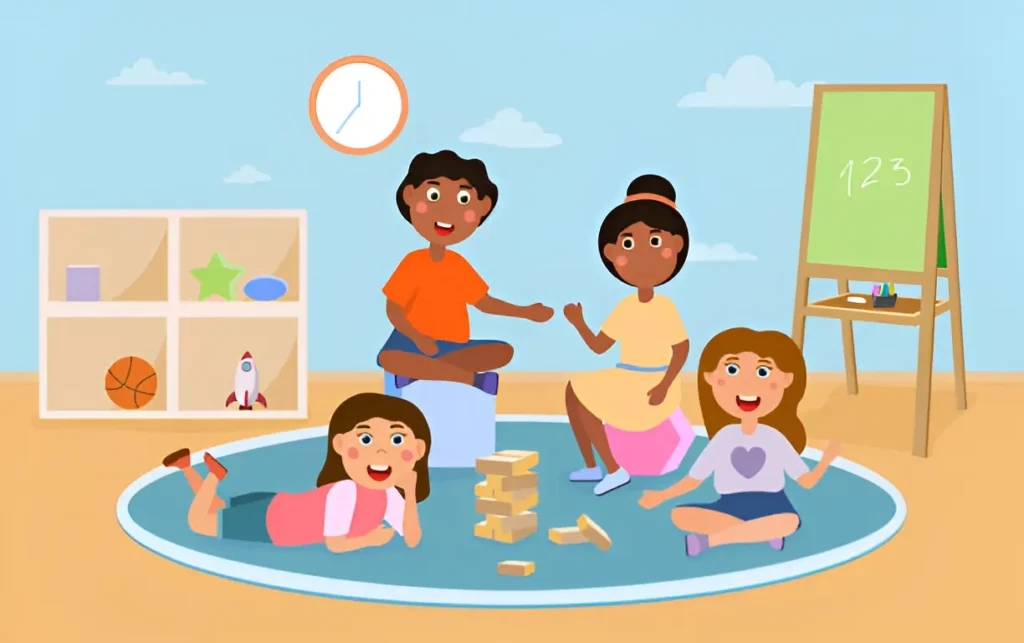Childhood is a crucial stage for emotional, social, and cognitive development. Beyond parental influence, early group environments like preschools and playgroups play a key role in shaping young minds, fostering important milestones that impact future relationships, learning, and emotional well-being.
What Are Early Group Environments?
Early group environments are settings where children from infancy to early childhood (typically ages 0–5) engage in activities together. These can be formal, such as preschools or daycare centers, or informal, like neighborhood playdates or community parent-led groups.
While the structure of these environments may vary, they all share a key trait: they bring children together in shared spaces where interaction, cooperation, and communication are necessary. These spaces often serve as mini ecosystems where children learn to navigate relationships, explore new experiences, and develop essential skills through interaction with peers and responsive adults.
Why Are Early Group Environments Important?
The formative years of life are marked by rapid brain development. According to research from the Center on the Developing Child at Harvard University, by the age of three, a child’s brain has developed approximately 80% of its final adult size. This timeframe represents a window of opportunity where the quality of the environment can profoundly influence developmental outcomes.
Early group environments play a key role in shaping core aspects of a child’s development, including:
1. Social Skills and Emotional Intelligence
Interacting with peers in group settings helps children develop vital social skills such as sharing, taking turns, and resolving conflicts. These environments foster empathy and emotional intelligence, as children learn to express their own feelings while respecting those of others.
For example, during group activities, children often face situations that test their patience or challenge their communication skills, such as waiting their turn on the playground or explaining their interpretation of a story in a circle time discussion. These small but meaningful experiences lay the groundwork for effective communication and relationship-building later in life.
2. Cognitive Development
Early group environments expose children to a wide range of sensory, linguistic, and problem-solving experiences. Studies have shown that group activities, such as cooperative games and shared storytelling, stimulate cognitive development by encouraging critical thinking, memory retention, and language acquisition.
For instance, imagine children working together on a simple puzzle. They not only enhance their fine motor skills but also practice critical thinking, collaboration, and verbal expression as they discuss where each piece might fit.
3. Preparation for Structured Settings
Preschool and daycare environments, like those in Eastside Tucson, introduce children to structured routines, which can prepare them for formal education. Group environments often follow schedules with set times for activities, snacks, and rest, helping children adapt to predictable daily rhythms. Additionally, these routines help foster self-regulation skills, such as focusing attention on tasks, managing transitions, and understanding the concept of rules.
Positive Impacts of High-Quality Early Group Environments
Not all group environments are created equal. The quality of care and interaction that children receive in these settings determines the extent of their developmental benefits. High-quality group environments exhibit the following characteristics:
1. Responsive Caregivers
Caregivers who are attentive, nurturing, and responsive to individual needs create a secure atmosphere that fosters learning and growth. They serve as role models for empathetic communication and support, which children mimic in their interactions with peers.
2. Rich Learning Materials
Engaging spaces equipped with age-appropriate learning materials spark curiosity and exploration. From books and building blocks to art supplies and musical instruments, these tools encourage creativity and cognitive development.
3. Diverse Social Experiences
Group settings that promote cultural diversity and inclusivity expose children to different perspectives, fostering adaptability, tolerance, and a global mindset.
4. Guided Play
Play serves as a natural mode of learning for children. Structured play activities that align with developmental goals, such as storytelling, role-playing, or group problem-solving, nurture interpersonal and cognitive skills.
Challenges and Risks in Group Settings
While early group environments offer numerous benefits, they are not without challenges:
- Overcrowding and Limited Attention: Settings with high student-to-teacher ratios can make children feel overlooked, which may hinder their social and emotional growth.
- Peer Conflict: While peer interactions are vital for development, frequent exposure to unmanaged conflicts can cause stress in children if not properly addressed by caregivers.
- Health Concerns: Young children in group environments are often exposed to germs, leading to an increased risk of illness. This is particularly common in daycare settings where hygiene may be difficult to maintain due to the age and activity level of the attendees.
How Caregivers and Parents Can Maximize the Benefits
Parents and caregivers play a crucial role in ensuring that children benefit from their experiences in early group environments. Here’s how they can help:
- Conduct Thorough Research: Visit multiple providers or group settings to assess the quality of care, the teacher-to-child ratio, and the facility’s overall structure.
- Stay Actively Involved: Communication between parents and caregivers can directly impact a child’s experience. Sharing insights into a child’s routines or preferences can help caregivers tailor their approach.
- Encourage Reflection at Home: Asking children open-ended questions about their day helps reinforce what they’ve learned, while also fostering emotional expression.
- Model Social Skills: Children learn by example, so demonstrating respect, active listening, and kindness at home can further reinforce the lessons they absorb in group settings.
Conclusion
The early years of a child’s life are crucial for growth and learning. Thoughtfully designed group environments help children develop essential life skills, such as sharing and critical thinking, creating lasting positive impacts.
Readc more: Discover The Best Multiplayer Online Games for Ultimate Entertainment – Dimensions Script
Why is Pest Control Important in a Food Establishment? – Dimensions Script
Face Swap AI: Exploring the Latest in Digital Creation and Editing


